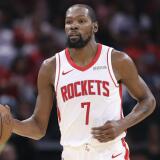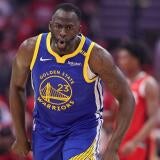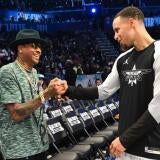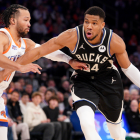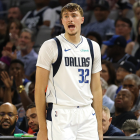76ers vs. Knicks: Shake Milton's 50-foot buzzer-beater swings game, shines light on NBA's anti-heave epidemic
Avoiding end-of-quarter heaves is an epidemic in today's efficiency-obsessed game
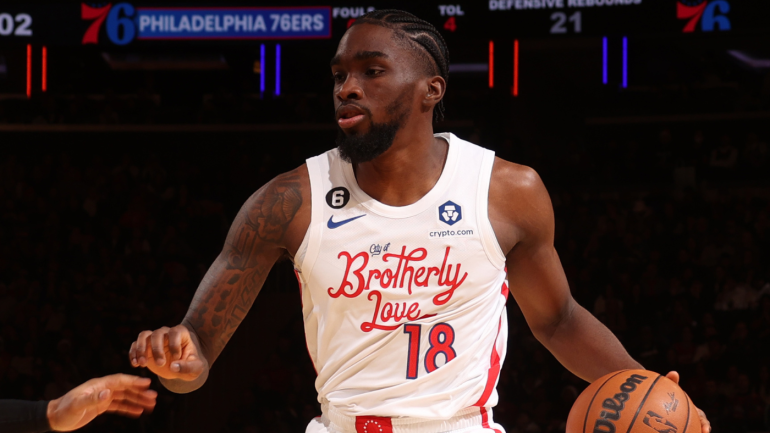
NBA players refusing to attempt end-of-quarter heaves is an epidemic of insecurity and vanity. Guys cannot stand the idea of their precious shooting percentage taking even a minuscule hit, and as such, they're shamelessly willing to pass on potential points for their team by either just dropping the ball and walking off the court or deploying the "vet move" of waiting until a split second after the buzzer sounds to cut a heave loose.
Either way, they are openly announcing that they care more about their statistics, even at entirely insignificant levels, than they do winning. There is no other way to look at it. Even if you only make one out of every 100 shots that you fling up, from a scoreboard perspective, there is only upside with these attempts.
Case in point: Shake Milton to end the first half of Philadelphia's 119-112 victory over the Knicks on Christmas.
Shake Milton with a WILD chuck at the buzzer that goes in 😲pic.twitter.com/eVTsfy4Gmv
— Def Pen Hoops (@DefPenHoops) December 25, 2022
That's a preposterously difficult, 50-foot on-the-run bomb that had very little chance of going in. But Milton took it anyway, and it represented a legitimate swing in the game as the Knicks went from having possession with a chance to end the half up by eight, possibly nine with a 3-pointer, to only being up three.
That was the Sixers' reward. A potential six-point swing in a game they wound up winning by seven. Again, the only risk was a basically imperceptible decline in Milton's traditional-source shooting percentage.
I say traditional source because there are outlets that remove heaves from a player's shooting ledger, namely Cleaning the Glass, which also eliminates garbage-time statistics. But as long as standard percentages include these improbable attempts, guys are going to avoid taking them. Except for Stephen Curry, who consistently launches up heaves with no regard for his percentages. He should be commended more than he is for doing so.
Yes, efficiency is the name of today's game, and theoretically, dipping your shooting percentage by firing up heaves could cost you some money come contract time. But these teams are smarter than that. Again, all they have to do is go to Cleaning the Glass and they'll be able to get a true read on a guy's shooting percentage -- which is almost never more than one percent different than on traditional sites anyway.
Indeed, this is pure vanity. It's like batting average in baseball. Guys want to look at a piece of paper and see the highest number possible. The difference between .300 and .299 can feel like the difference between a journeyman and a Hall of Famer. It's not, of course. But athletes love their numbers. Put up 25-10-9 in an NBA game, and nobody will care. Put up that 10th rebound or assist, and headlines write themselves.
There's also a confidence factor to consider. You would think that the greatest basketball players on earth would be largely immune to confidence dips, but that's not even close to true. If a guy is already having a tough shooting night, the last thing he wants is to go from 2-for-9 to 2-for-10. Conversely, if he's having a hot night, he's not about to depreciate a good line.
These players' psyches are more fragile than you think. Again, this is another reason to applaud Curry, who is unafraid to throw up a 70-footer even when he's having a bad night already. Not many guys, even the stars, have that kind of security, or humility, however you want to look at it, in themselves.
To be fair, this particular kind of heave is one players will attempt more often. It happened off a loose ball and was more a reaction than one where Milton had time to think about the statistical consequences. Had Philly been inbounding the ball behind half court, chances are that shot would've been tossed up conveniently tardy. Nonetheless, that's not the point A heave is a heave, and they should be attempted every single time unless guys are just going to opening admit to prioritizing themselves over the team.
If pressed, they would never do that. They would tell you these shots don't matter, and ultimately, they aren't going to factor into a lot of games. More, it just speaks to a mindset of actually being all about winning over your own statistics.
But for the Sixers, it mattered on Christmas. The Knicks controlled that game throughout the first half, and Milton's shot was the beginning of all the momentum swinging to Philadelphia. Again, three points in a seven-point game is a huge deal. A potential six-point swing is obviously even bigger. You could argue Milton's shot was the most important shot of that game, and there are a lot of players who wouldn't even have taken it.
![[object Object] Logo](https://sportshub.cbsistatic.com/i/2020/04/22/e9ceb731-8b3f-4c60-98fe-090ab66a2997/screen-shot-2020-04-22-at-11-04-56-am.png)


